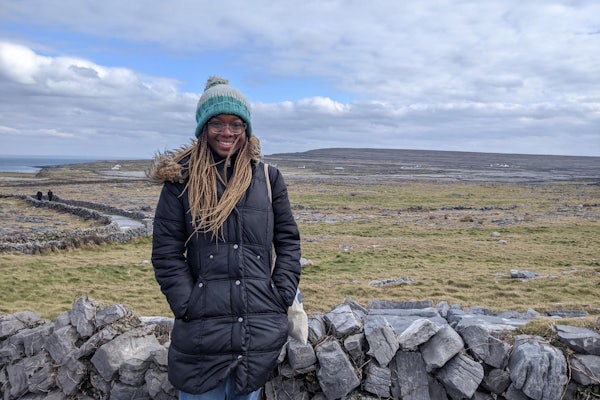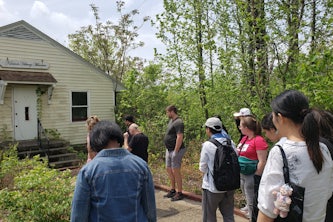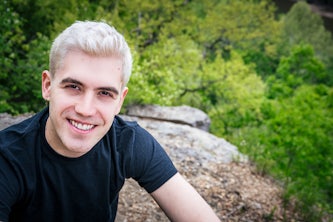‘We are global citizens’: Students on the benefits of study abroad
Four McKelvey Engineering students share their study abroad experiences and why others should take part

The McKelvey School of Engineering at Washington University in St. Louis offers students the opportunity to travel and study at more than 20 institutions around the world. We asked four students who studied abroad to share their experiences and what they learned from their travels.
Esther Faronbi
Esther Faronbi, a senior majoring in chemical engineering, spent a semester studying at the University College Dublin in Dublin, Ireland.

Where are you studying and what courses are you taking?
I took “Biochemical Engineering Lab I,” “Air Pollution,” “Biotechnology Principles,” “Statistics and Probability” and “Discovering Ireland: Landscape.”
How has studying in another country enhanced your education?
Studying abroad allowed me to explore the biological side of chemical engineering through the biochemical engineering course that I could not have taken at WashU. I also had the unique opportunity to learn about Irish anthropology and archeology through a field-trip course in the archeology department.
What do you love most about Dublin?
My two favorite things about studying abroad in Ireland were the people and the scenery. Irish people are welcoming, kind and open to sharing their culture. In addition to connecting with Irish people, I also loved meeting people from all over the world. UCD has a huge international student community, and interacting with people from all over enriched my understanding of different cultures.
Apart from the people I met, my other favorite thing was the Irish landscape. I never got tired of seeing rolling green hills and quaint little fishing towns along the Irish coastlines.
What has been the most challenging part of studying abroad?
The most challenging part of studying abroad was feeling like I was starting my academic career all over again. As an upperclassman, it was hard to be in a situation where I was like a first year in school again. At the beginning of the semester, I didn't have a group of friends that I could hang out with or the comfort of seeing familiar faces at campus events. Although this was the most difficult part of being abroad, it helped me develop into a more socially adaptable person and gave me opportunities to step outside of my comfort zone to meet new people.
Why is it important for students to travel and study in other countries?
Studying in other countries is important because it allows for more personal development than short trips. Studying abroad allows students to immerse themselves in a new culture by learning how people there learn. It teaches college-aged adults that we are global citizens and not just citizens of our respective home countries. Overall, study abroad is a unique, life-changing experience that everyone should at least consider.
Natalie Fisher
Natalie Fisher, a junior majoring in mechanical engineering, spent a semester studying at the University of Edinburgh in Scotland.

Where are you studying and what courses are you taking?
I’m studying mechanical engineering and taking “Polymers and Composite Materials,” “Environmental Engineering and Sustainability,” “Thermodynamics,” “Fluid Mechanics” and “Creating Edinburgh” this semester.
How has studying in another country enhanced your education?
Studying in Edinburgh has been amazing because it’s allowed me to take classes not offered at WashU and to take part in fun clubs and societies. I've loved getting to know a new group of people and learning how they approach engineering.
What do you love most about Edinburgh?
The walkability of Edinburgh and the friendliness of the people here are my favorite things about the city. Everything you need is right around the corner, and it's very easy to get around and explore.
What has been the most challenging part of studying abroad?
The most challenging part of studying abroad has been balancing studying and life.
Why is it important for students to travel and study in other countries?
It's important for students to study abroad to expand their perception of the world. As engineers, we will be making products or designing solutions to problems occurring all around the world, and it's important to see how these debates or issues play out outside of the United States. It's also so much fun. The opportunity to live in another country for a few months without being restricted from travel by a job is amazing.
Jonathan Graham
Jonathan Graham, a senior majoring in chemical engineering, spent a semester studying at the University of Carlos III Madrid in Spain.

undergraduate career.
Where did you study and what courses did you take?
I took biology, statistics, Spanish, “The Iberian Peninsula: Cultures and Religions Through the Arts” and an art workshop. The Iberian Peninsula class was one of my favorites because it was a deep dive into Spain, its history and its people through the lens of art. Additionally, my professor, Prof. Juan Arana, was a truly valuable resource in engaging with these ideas, and his style of leading conversations to educate was fulfilling and beneficial.
How has studying in Spain enhanced your education?
I appreciate how studying in another country has exposed me to a plethora of personalities, means of communication and values. Through these interactions, I have been able to enhance my ability to learn, allowing new perspectives on material and ideas.
Also, after many conversations with people, I have learned so much about life, myself and how we all connect. It has given me direction in approaching my education that I would not have found in St. Louis.
What do you love most about studying in other countries?
My favorite thing about studying abroad is meeting people, perhaps due to the knowledge that you are leaving before long and do not care as much about making an impression. For example, knowing there is someone in Bulgaria who once laughed at a joke of mine while sharing a ski lift is an odd feeling, but it’s one that studying abroad offers.
What has been the most challenging part of studying abroad?
For me, the most challenging part of studying abroad was the loneliness that would creep up on me. Truthfully, Madrid was a bit of a painful place for me to be and I felt very isolated. I traveled solo as a result and met some incredible people through those adventures.
I miss Madrid now and I miss the things that I did not do because of how little of myself I felt I could offer. I hope to return someday soon and rediscover the city.
Why is it important for students to travel and study in other countries?
Studying abroad offers so much to expand your thoughts. It’s about the constant introduction of new experiences, as well as finding a home in different lands. It’s also an experience of trust: trusting yourself in foreign situations and trusting others helping you along the process. After the time abroad, you can look at yourself as someone who did something incredible and is capable of more.
Melissa Marks
Melissa Marks, a senior majoring in computer science, spent a semester studying at Vrije University in Amsterdam.

Where are you studying and what courses are you taking?
I study computer science, and while abroad in Amsterdam, I took three courses related to my major and two humanities courses: “Automata and Complexity,” “Text Mining,” “Networks and Graphs,” “Political Participation and Protest” and “Dutch Language and Culture.”
How has studying in another country enhanced your education?
By studying abroad in another country I have gained a greater understanding of the world around me. This contributed to my education in many ways, specifically by giving me new perspectives to consider while living, learning and growing.
What do you love most about Amsterdam?
What I love most about Amsterdam is the culture. People in Amsterdam are laid back and value things like positive mental and physical health practices, socializing and being outdoors. Everyone is very kind and polite, creating a calm culture and environment. Another thing I love most about Amsterdam is the canals and closeness to water. The canals are beautiful, especially when biking around the city.
What has been the most challenging part of studying abroad?
The most challenging part of studying abroad was being so far away from my family. Though it was challenging, once I settled in, I found good times to call and text with family and friends in the United States.
Why is it important for students to travel and study in other countries?
It’s so important for students to travel and study in other countries to gain experiences outside of their comfort zone and life in the States and at American universities. I grew so much as an individual during my study-abroad experience through meeting new people, spending time alone, truly being independent and managing my travels.
Click on the topics below for more stories in those areas
- Global
- Undergraduate Students
- Mechanical Engineering & Materials Science
- Computer Science & Engineering
- Energy, Environmental & Chemical Engineering



